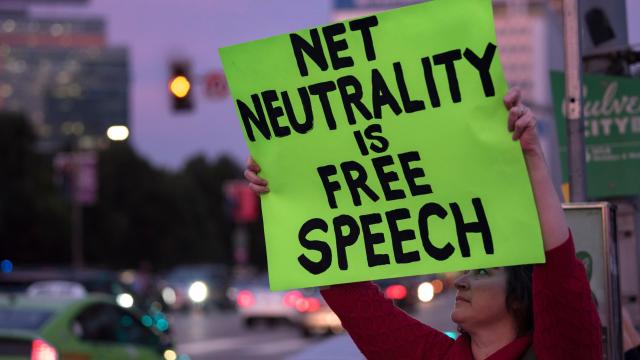In a major victory for open internet activists, a federal court has once again shot down the telecom industry’s challenge to a California state net neutrality law.
The U.S. Court of Appeal ruling on Friday stated that the Federal Communication Commission’s 2017 decision to eviscerate Barack Obama-era federal net neutrality regulations did not bar states from enacting their own replacements. It also upheld a lower court’s denial of an injunction to prevent the law, SB 822, from going into effect.
California’s SB 822 was enacted in 2018 and prevents service providers from throttling or blocking traffic on a selective basis as well as prohibits them from offering paid fast lanes (essentially payoffs to pick and choose which traffic gets priority). A coalition of industry-backed associations, including ACA Connects, CTIA, NCTA, and USTelecom, tried to smother it in the cradle with a lawsuit against the state, arguing the FCC’s 2017 action prohibited states from passing similar laws to protect consumers. In effect, this argument was tantamount to claiming no one — not the feds, not the states — had the authority to regulate them in lieu of action by Congress. SB 822 went into effect last year and the U.S. District Court for the Eastern District of California denied the telecom associations’ request for the injunction.
When the FCC revoked the federal net neutrality rules in 2017, its five-member commission was under the thumb of Ajit Pai, Donald Trump’s appointee. Pai has since slunk off to ooze under a rock somewhere, and Joe Biden’s administration has yet to push its nominee for his replacement, Gigi Sohn, through the Senate approval process. That means the two Democrats left at the FCC are tied with the Republicans — fervent MAGA types Brendan Carr and Nathan Simington, the latter of whom was reportedly the architect of a bizarre plan to turn the FCC into a sort of pro-Trump speech police — and thus they are unable to simply undo Pai’s work. (This situation may soon change, as the Senate Commerce Committee has scheduled a vote on whether to move Sohn’s nomination to the full floor for a vote next week.)
In a 3-0 ruling on Friday, the 9th Circuit Court of Appeals said that the specific way the FCC went about nuking the federal rules in 2017 meant it had essentially tossed the issue to the states. The court found that as “only the invocation of federal regulatory authority can preempt state regulatory authority… by classifying broadband internet services as information services, the FCC no longer has the authority to regulate in the same manner that it had when these services were classified as telecommunications service.”
“In this case, of course, the FCC has not adopted any regulatory measures,” the court continued. “It has instead diminished its authority to regulate by its reclassification of the service providers to a relatively unregulated category under the Communications Act. There is thus no conflict between the state’s enactment of SB-822 and the FCC’s order.”
“Once again, a piecemeal approach to this issue is untenable and Congress should codify national rules for an open Internet once and for all,” the associations opposing the law told CNBC in a statement. Tom Johnson, the FCC’s general counsel during Trump’s tenure, told Reuters the decision “creates confusion.” He added the U.S. Supreme Court, which is currently dominated by Republican appointees, “will have to address the role of the states in this area.”
Open internet advocates are celebrating the decision as a huge victory against the telecom lobby and as a clear invitation for states to move forward if the FCC failed to reinstate the rules. Democratic FCC commissioner Jessica Rosenworcel called the decision “good news” on Friday, according to Reuters, though she added the FCC needs to reclaim its authority to once again make open internet rules “the law of the land.”
“This decision is a huge step forward, but the California law had an impact even before it cleared this latest court hurdle,” Matt Wood, vice president of policy and general counsel for Free Press, which filed an amicus brief supporting the state, wrote in a statement via email. “Industry lobbyists and other net neutrality opponents have argued, loudly but cynically, that the repeal of the FCC’s rules had no impact. But the passage of this strong state law meant ISPs still had to respect open-internet principles even before this latest victory because they knew their stall tactics in the Ninth Circuit were likely to fail, as they now have twice.”
“… This win is significant because it offers protections to people in our most populous state and drives the national conversation forward,” Wood added. “Yet tremendous as it is, we still need the Biden FCC to reclaim its authority not just for nationwide open-internet rules, but for policies promoting affordable, resilient, just and reasonable internet connections for everyone.”
Fight for the Future, a digital rights nonprofit that organised in favour of SB 822, was more direct. In an email to Gizmodo, director Evan Greer wrote their official statement was “Eat shit, AT&T.”
Editor’s Note: Release dates within this article are based in the U.S., but will be updated with local Australian dates as soon as we know more.
